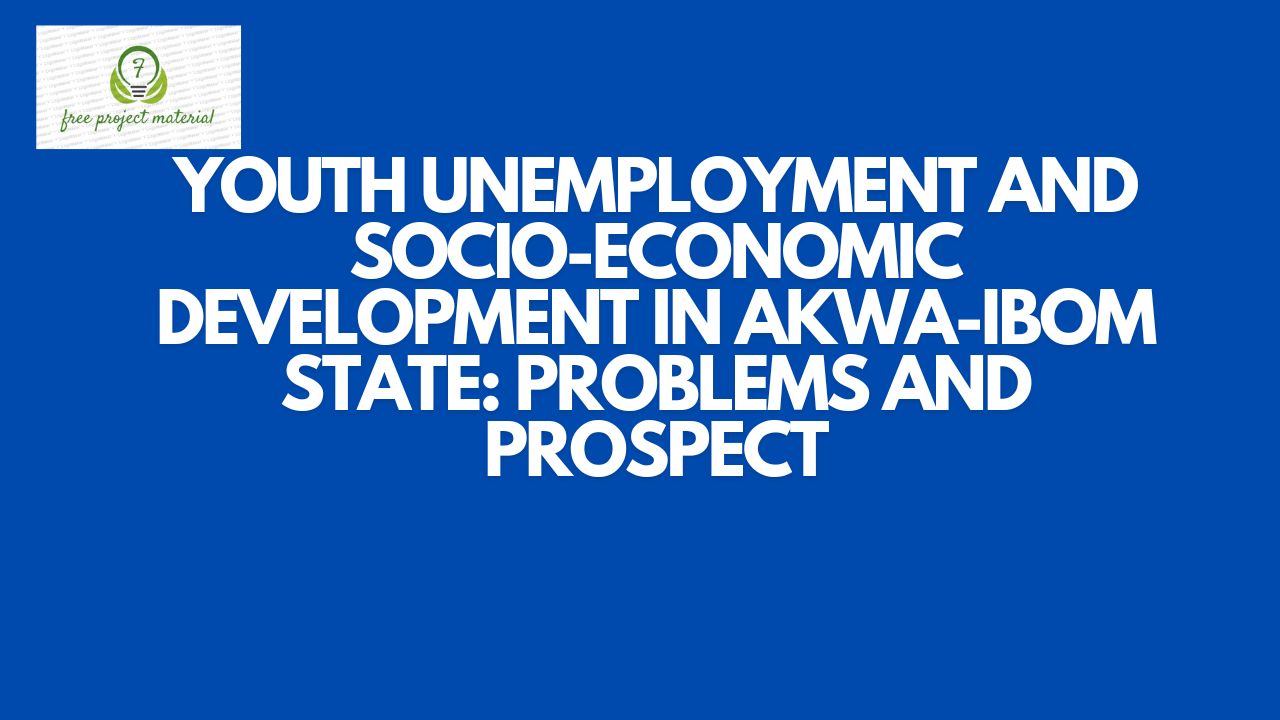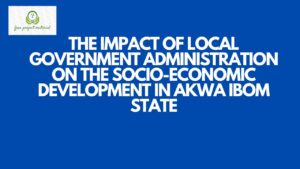ABSTRACT
This research was undertaken to examine the youth unemployment and socioeconomic development in Akwa Ibom State: problems and prospects (A case study pf youth and sport Uyo). The study adopted the survey research design while the convenience sampling technique was used to select fifty (50) respondent as sample size for the study. The instrument of the study was a self developed questionnaire and forms were personally administered by the researcher. The revealed that the causes of youth unemployment and socio-economic development in Akwa Ibom State include; high interest rate, financial crisis, global recession.. the study further revealed that the effect of youth unemployment and socio-economic development in Akwa Ibom State include: reducing the overall spending in the country, reducing the nation output of goods ands services, fluctuating the workplace makeup. Useful recommendation were made such as: address socio-economic deprivation and create jobs to hold the spread of social unrest resulting from youth employment, community collaboration, to create jobs should be encourage and embarked upon. In other words. The youth should be encouraged to form cooperatives with the aim of brainstorming ideas about project that can create jobs in the community.
LIST OF TABLES
Table 3:1 Sample Design – – – – – – – 16
Table 4.1.1: Responses to Research Question One – – – 19
Table 4.1.2: Responses to Research Question Two – – – 20
Table 4.1.3: Responses to Research Question Three – – 22
TABLE OF CONTENTS
Title Page – – – – – – – – i
Approval page – – – – – – – ii
Certification – – – – – – – – iii
Dedication – – – – – – – – iv
Acknowledgements – – – – – – v
Abstract – – – – – – – – vi
List of tables – – – – – – – vii
Table of contents – – – – – – – viii
CHAPTER ONE: BACKGROUND OF THE STUDY
1.1 Introduction – – – – – – – – 1
1.2 Statement of the problem – – – – – – 2
1.3 Objectives of the study – – – – – 3
1.4 Research Question – – – – – – – 3
1.5 Significance of the study – – – – – – 4
1.6 Scope/Limitation of the study – – – – – 4
1.7 Organization of the study – – — – – – 5
1.8 Definition of term – – – – – – – 6
CHAPTER TWO
REVIEW OF RELATED LITERATURE
2.1 Introduction – – – – – – – – 7
2.2 Concept/meaning of youth unemployment – – – 7
2.3 The causes of unemployment and socio-Economic Development in Nigeria – – – – – – 8
2.4 Consequences of youth unemployment and socio-Economic Development in Nigeria – – – – – – 10
2.5 The Effect of Youth unemployment and Socio-Economic Development in Nigeria – – – – – – 13
CHAPTER THREE
RESEARCH METHODOLOGY
3.1 Research Design – – – – – – – 15
3.2 Population of the study – – – – – – 16
3.3 Sample and sampling technique – – – – – 16
3.4 Instrumentation – – – – – – – 16
3.5 Method of Data Analysis – – – – – – 17
3.6 Problems of Data Collection – – – – – 17
CHAPTER FOUR
DATA PRESENTATION ANALYSIS AND DISCUSSION OF FINDINGS
4.1 Data presentation analysis – – – – – 19
4.2 Discuss of Findings – – – – – – 23
CHAPTER FIVE
SUMMARY OF FINDINGS, CONCLUSION AND RECOMMENDATIONS
5.1 Introduction – – – – – – – – 25
5.2 Summary of Findings – – – – – – 26
5.4 Conclusion – – – – – – – – 26
5.3 Recommendations – – – – – – – 27
References
Appendix
CHAPTER ONE
BACKGROUND OF THE STUDY
1.1 Introduction
One of the greatest challenges facing the Nigeria economy is unemployment which has maintained a rising trend over the years. The problem of unemployment in Nigeria is a national issue that should be handle with care. The rate of unemployment in Nigeria since 1973 has been growing in a geometric progression and the issue has become a world-wide phenomenon demanding for increase attention as the impact is more devastating (Tzjikeme, 2014). According to the National Bureau of statistics (2012), Nigeria rate of unemployment stand at 19.7%. in fact, Akeju & Olanpekun, (2014), identifies unemployment as one of the major challenges/confronting the Nigeria economic development. The menac of unemployment in Nigeria since early 1980s has been an issue of great concern to the economists, policy makers, economic managers, individual, government and many others (Bello, 2003). The effect of financial crisis on public and private sectors has led to renew attention on the phenomenon. Fadayomi, (2002) and Osinubi (2006), argued that unemployment is as a result of the inability to develop and utilize the nation’s manpower resources effectively. Fajana (2000) defined unemployment as a situation where people who are willing and capable of working are unable to find suitable paid unemployment. He also said further that the higher the rate of unemployment in an economy, the higher the level of poverty and associated welfare challenges. It is a widely accepted view in economics that the growth rate of Gross Domestic Product (GDP) of an economy increases employment and reduces unemployment.
Unemployment is generally seen as a macro-economic problem as well as socio-economic problem. It has been categorized as one of the serious impediment, to social progress. Unemployment arises as a result of insufficient and non-availability of jobs to correspond with the growing population, even those who are employed sometimes lives with the fear of being unemployed due to job insecurity & retrenchment of works.
1.2 Statement of the Problem
The level of unemployment in Nigeria has grown large as it affected the youth and the economic development of the country from a broad spectrum of socio-economic perspective. It is obvious that unemployment especially that of graduates impedes Nigeria’s progress in several ways. Apart from the economic waste it brought to the nation, it also constitutes political unrest for the country.
Thus, the situation is disturbing and even more disheartening that the country’s economic condition cannot absorb an optimal proportion of its labour force. This situation has contributed to the increase in crimes and other social vices experienced in our society in recent time. Based on the this aforementioned reason, the study sought to investigate the youth unemployment and socio-economic development in Akwa Ibom State.
1.3 Objectives of the Study
- To find out the causes of youth unemployment and socio-economic development in Aks.
- To examine the effect of youth unemployment and socio-economic development in Aks.
- To look for the way forward in reducing the rate of unemployment in Nigeria.
1.4 Research Questions
- What are the causes of youth unemployment and socio-economic development in Aks?
- What are the effect of youth unemployment and socio-economic development in Aks?
- What are the way forward in reducing the rate of youth unemployment in Nigeria?
1.5 Significance of the Study
It is hoped that this work will be of importance in the following ways:
- The research will help to examine the situation of unemployment in Nigeria, it caused and affects. Its finding will enable us to ensure sustainable economic development and growth by investing heavily on socio-economic development sectors while this turn will reduce unemployment in the country.
- This study hopefully will draw the attention of the government, private sectors and non-governmental organizations on how to tackle and eradicate unemployment in the country.
- The result of this research will also help individuals and students who will find it as a useful and research materials in future.
1.6 Scope and Limitation of the Study
This research work center on youth unemployment and socio-economic development in Aks: Problems and Prospect. (A Case Study of Ministry of Youth & Sport).
Limitation of the Study:
- Financial factor: Inadequate funds affected the way data were collected since the researcher had to travel long distance for the distribution of the research questionnaire forms.
- Time factor: This affected the reduction in the size of sample used for the study because the researcher had only less than two months to complete the study.
- Material factor: Shortage of relevant materials for literature review posed a great difficulty.
1.7 Organization of the Study
The study was organized into five chapters.
Chapter one featured the introduction which provides an insight to what the study is all about.
Chapter two presenter review of related literature that is the views of other scholars on the subject matter.
Chapter three embodied the methods and procedures of conducting the study.
Chapter four dealt with data presentation, analysis and interpretation.
Chapter five was the conducing section that deals with summary of findings, conclusion and recommendation based on the findings of the study.
1.8 Definition of Terms
- Youth unemployment: Refers to the share of the labour force ages 15-24 without work but available for and seeking employment.
- Socio-economic development: therefore, is the process of social and economic development on a society. It is measured with indicators, such as gross domestic.
- Unemployment is a term referring to individuals who are employable and actively seeking a job but are unable to find a job.
- Development: The act or process of growing, progressing or developing.
- Socio-economic: It refers to the interaction between the social and economic habits of a group of people.
- Causes: It refers to a person or thing that gives rise to an action, phenomenon, or condition.
Effect: It refers to a change which is a result or consequence of an action or other cause.



